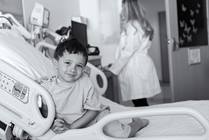Search Results
Viewing: 41-50 of 351 | All
Article
Auditory Brainstem Response (ABR) with Sedation or Anesthesia
This Helping Hand™ explains the process of an auditory brainstem response (ABR) with light sedation or anesthesia.

Condition
Gynecomastia
This Helping Hand™ is about gynecomastia and explains what it is, how it is treated and what the symptoms are.
Article
Social Security Disability Insurance (SSDI)
Social Security Disability is a government program that gives money to people who cannot work because of a medical issue that is expected to last at least one year or result in death.
Article
Pasteurized Donor Milk for Your Hospitalized Baby
This Helping Hand™ is about what pasteurized donor milk is and why some babies may need it. It also talks about the process of pasteurizing and how you can become a donor.

Condition
Lymphoma
Lymphoma is cancer which arises in the lymph system, the body’s circulatory network for filtering out impurities. There are two broad varieties, Hodgkin’s disease, and Non-Hodgkin’s lymphoma.

Article
Wilms' Tumor Treatment Options
The types of treatment used most often to treat childhood cancer are surgery, chemotherapy, radiation therapy, and bone marrow transplantation. The goal of treatment is to destroy the cancer cells. Learn more about treating Wilms' tumor.
Article
Preparing the Skin Before Surgery
Bathing your child before surgery will help reduce the number of germs on their skin. Fewer germs on the skin means less chance of an infection after surgery.
Article
Patient Safety in the Health Care Setting
We are committed to giving quality health care to your child and keeping them safe while here. Parents or legal guardians play a vital role in the effort by being actively involved and informed.
